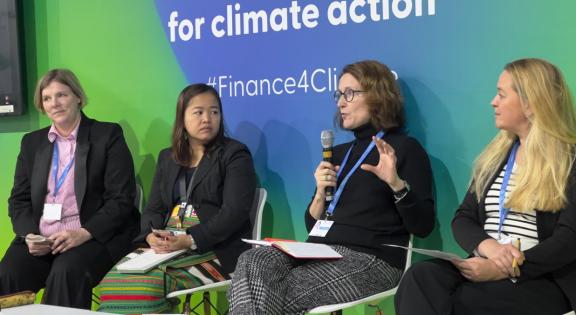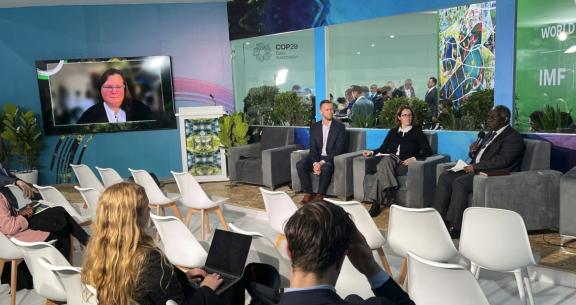IRM underscores the crucial role of accountability at COP29
At COP29 in Baku, Azerbaijan, the IRM participated in two side events that highlighted the significance of accountability in climate finance.
Climate finance: accessing funds & ensuring accountability
On Monday, 18 November, the three GCF Independent Units held a joint event at the Climate Funds Pavilion to discuss the challenges and opportunities in ensuring accountability in climate finance.

The heads of the three independent units—Karen Ernst (IIU), Sonja Derkum (IRM), and Andreas Reumann (IEU)—began the event by explaining the role of each unit. Andreas started the discussion by presenting a recent IEU evaluation that looked into the challenges in accessing GCF. Next, Karen and Sonja discussed the importance of policies around integrity and accountability that can help ensure the proper use of GCF funding.
This was followed by a Q&A session that included two additional panelists: Helen Magata from Tebtebba, an Indigenous Peoples organization in the Philippines, and Melanie Pill from the Lowy Institute, a political and economic think tank in Australia. The panelists emphasized several key aspects of climate finance, including the importance of robust accountability mechanisms to advance climate action, the need for engagement with Indigenous Peoples, and collaboration with other international climate funds. The session was moderated by Martin Prowse, IEU Evaluation Specialist.
Why Accountability is Key to a Successful Just Transition
On Wednesday, 20 November, the IRM joined the World Bank Inspection Panel, Transparentem and the International climate Initiative (IKI ICM) for a side event in the World Bank Group Pavilion.
The event featured Sonja Derkum, IRM Head, Andrea Kaempf, Head of the Complaints Office of the Independent Complaint Mechanism of the International Climate Initiative and Jonathan Mead, Director of Investigations at Transparentem. Ibrahim Pam, Chairperson of the World Bank’s Inspection Panel moderated the session.

Panellists emphasized the importance of effective and accountable climate finance that protects communities and prevents negative outcomes. They noted that projects can lead to issues such as forced resettlement, inadequate consultation, and weak grievance mechanisms. They called for smarter spending, robust safeguards, and stronger integrity systems to ensure that climate finance provides lasting benefits and supports sustainable development.
"Even with the best checks and balances, you can have the adverse impacts… It’s crucial that communities have avenues to raise their grievances,” said Sonja Derkum.
Watch the full video recording here.